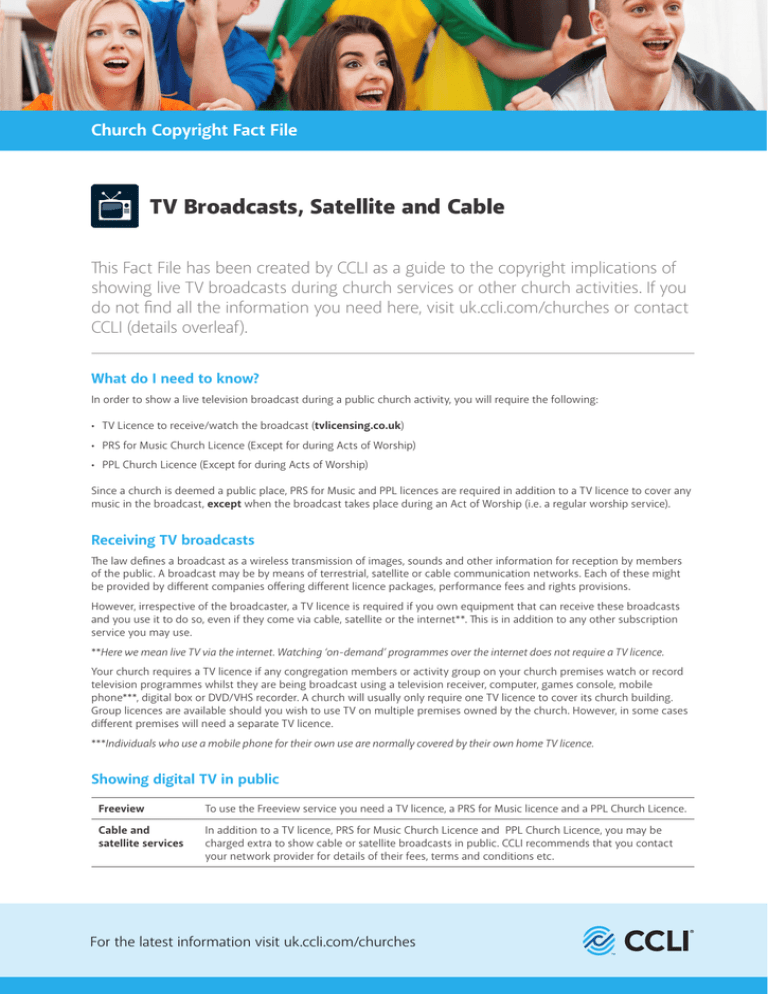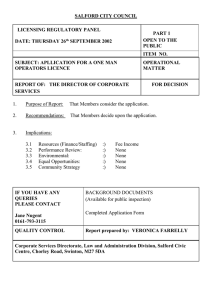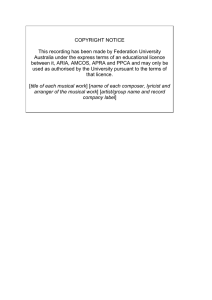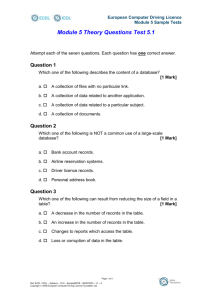TV Broadcasts, Satellite and Cable
advertisement

Church Copyright Fact File TV Broadcasts, Satellite and Cable This Fact File has been created by CCLI as a guide to the copyright implications of showing live TV broadcasts during church services or other church activities. If you do not find all the information you need here, visit uk.ccli.com/churches or contact CCLI (details overleaf). What do I need to know? In order to show a live television broadcast during a public church activity, you will require the following: • TV Licence to receive/watch the broadcast (tvlicensing.co.uk) • PRS for Music Church Licence (Except for during Acts of Worship) • PPL Church Licence (Except for during Acts of Worship) Since a church is deemed a public place, PRS for Music and PPL licences are required in addition to a TV licence to cover any music in the broadcast, except when the broadcast takes place during an Act of Worship (i.e. a regular worship service). Receiving TV broadcasts The law defines a broadcast as a wireless transmission of images, sounds and other information for reception by members of the public. A broadcast may be by means of terrestrial, satellite or cable communication networks. Each of these might be provided by different companies offering different licence packages, performance fees and rights provisions. However, irrespective of the broadcaster, a TV licence is required if you own equipment that can receive these broadcasts and you use it to do so, even if they come via cable, satellite or the internet**. This is in addition to any other subscription service you may use. **Here we mean live TV via the internet. Watching ‘on-demand’ programmes over the internet does not require a TV licence. Your church requires a TV licence if any congregation members or activity group on your church premises watch or record television programmes whilst they are being broadcast using a television receiver, computer, games console, mobile phone***, digital box or DVD/VHS recorder. A church will usually only require one TV licence to cover its church building. Group licences are available should you wish to use TV on multiple premises owned by the church. However, in some cases different premises will need a separate TV licence. ***Individuals who use a mobile phone for their own use are normally covered by their own home TV licence. Showing digital TV in public Freeview To use the Freeview service you need a TV licence, a PRS for Music licence and a PPL Church Licence. Cable and satellite services In addition to a TV licence, PRS for Music Church Licence and PPL Church Licence, you may be charged extra to show cable or satellite broadcasts in public. CCLI recommends that you contact your network provider for details of their fees, terms and conditions etc. For the latest information visit uk.ccli.com/churches Can we show Sky Sports for church socials/clubs? Satellite and cable companies offer a number of viewing packages for home and public viewing. You will need to contact your service provider to enquire about the particular channels you may wish to watch in a public setting. For example, visit www.business.sky.com. Recording from TV (time-shifting) Time shifting is the term used to describe recording a TV programme whilst you are out so that you can watch it at a more convenient time without infringing any copyright in the broadcast. This is permitted solely for private and domestic use and does not extend to the public viewing of recorded TV broadcasts. Streaming On Demand or Catch Up TV On Demand or Catch Up TV services such as BBC iPlayer are usually intended for private/domestic viewing only. Before streaming a programme from one of these services you should contact the provider to obtain permission. We only listen to the radio Generally speaking, you do not need a TV licence to listen to the radio. However, if you listen to a radio station using digital equipment which also receives TV programmes then you do need a TV licence unless your receiver is connected only to a hi-fi system. To listen to the radio in a public place you also need a PRS for Music Church Licence and a PPL Church Licence, both available from CCLI. What is copyright? Copyright is an intellectual property right given to the creators of original musical, literary and dramatic works. The Copyright, Designs and Patents Act 1988 (CDPA) is the legislation that currently operates in the UK and provides the creator with two main rights: Economic this allows the creator to charge anyone who wishes to copy, perform or record their work for any commercial or non-commercial use. Moral t his allows the creator to protect their work from any change which might be considered offensive or not in keeping with their wishes. Updated: October 2015 This Fact File is provided for information purposes only and does not constitute legal advice. If in doubt you should consult a legal expert. Whilst we aim to be as accurate as possible, CCLI can accept no responsibility for any errors or omissions in the information provided. Christian Copyright Licensing International (CCLI) Chantry House, 22 Upperton Road, Eastbourne, East Sussex BN21 1BF Registered in England & Wales: 2580472 • VAT No. 583 6735. Registered Office: Chantry House, 22 Upperton Road, Eastbourne, East Sussex, BN21 1BF



